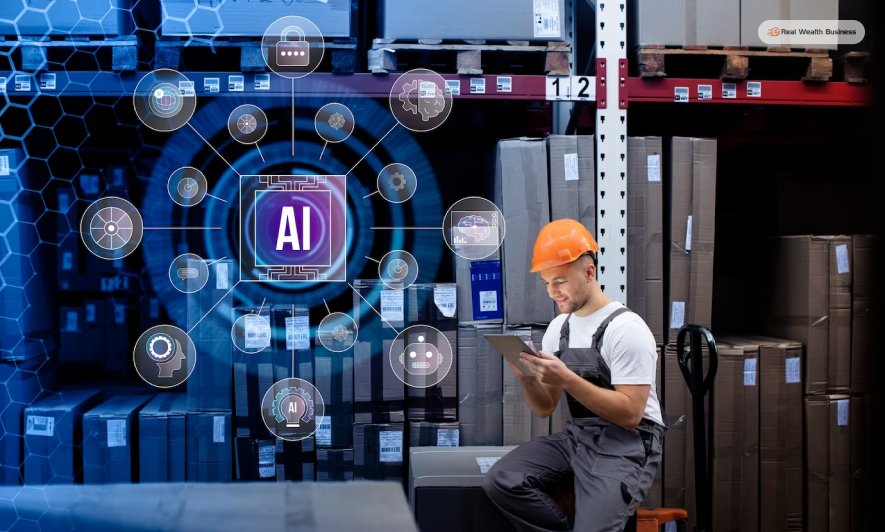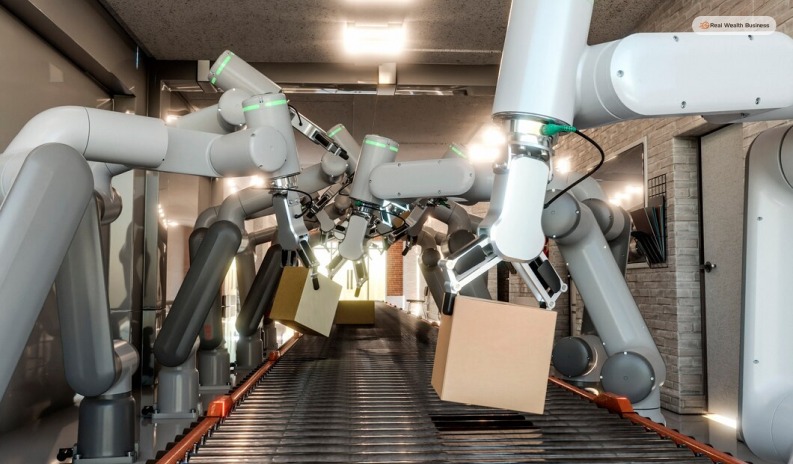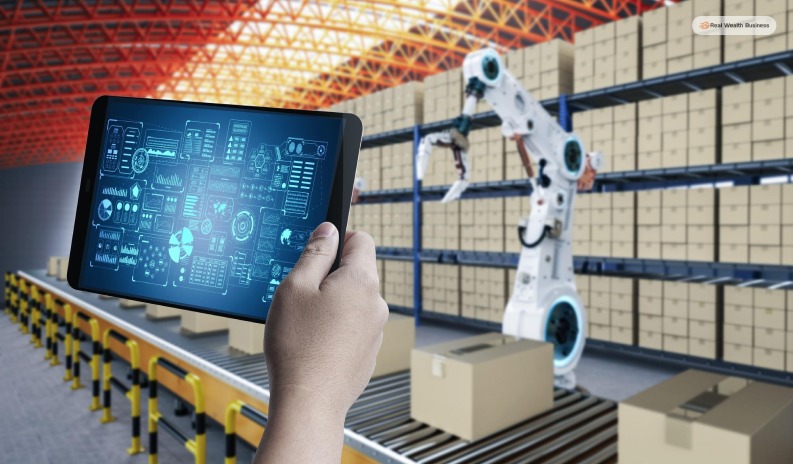The Future Of AI In Supply Chain Management: How AI Is Reshaping The Industry?
by Soumava Goswami Business Published on: 22 January 2024 Last Updated on: 25 September 2024

With the advent of artificial intelligence, supply chains are experiencing massive changes. From predictive analysis to real-time delivery tracking, the future of AI in supply chain management can be revolutionary. Even now, supply chain management is experiencing significant changes. The introduction of AI made processes simpler and helped drive efficiency. However, AI in business might also replace many jobs, which can be a big issue.
In this article, you will learn about the impact of AI on the supply chain soon. Firstly, we will discuss a general overview of the matter and how AI is initiating changes in the industry. Furthermore, we will also discuss the major applications of AI in supply chain management. Also, we will peek into how AI is helping create more powerful tools in supply chains. Finally, you will learn about how the new capabilities can benefit supply chains.
Future Of AI In Supply Chain: A General Overview

Although artificial intelligence cannot solve all the problems that supply chains face, it can still alleviate some of the major existing challenges. Companies willing to invest and able to unlock the potential of AI can get a distinct advantage quickly. With great changes in the technological landscape, every company needs to react quickly.
As complexity in the supply chain is constantly increasing, it has become essential for companies to automate their processes. Otherwise, it can be difficult for these companies to adapt quickly to rapid changes in supply chain technology. With the help of AI, supply chain companies can automate all the processes that are prone to human errors. Using AI will help supply chain management to deal with machines supervised by humans.
According to Thomson Reuters,
“Various forms of machine learning and automation have for years been changing how supply chains operate, and these changes have generally made global commerce more efficient and resilient, especially for the companies that have implemented them. However, the rapid development of increasingly powerful forms of artificial intelligence (AI) promises to do more than just improve upon previous generations of technology.”
Hence, you can see that as artificial intelligence and various forms of machine learning come into more use, there is a big impact on global supply chains. As of now, even generative AI (for example, OpenAI’s ChatGPT) has immense potential to make major alterations in supply chain management and organization.
However, with the rise in the usage of AI, supply chains are getting smarter. In this case, AI makes better use of operational data streaming from multiple devices and cloud applications. Furthermore, this new technology also applies advanced mathematics to create new systems, processes, and products that can learn and adapt.
The Future Of AI In Supply Chain Management: Smarter Supply Chains

According to IBM.com,
“The priorities represent the business and competitive challenges, as well as the current trends, that will affect companies’ operations. The plans are the investments in technology, processes, and people that organizations are making and plan to make over the next three years. And the purpose represents those initiatives, with emphasis on intelligence, that executives are prioritizing to aim for the highest return on their investments.”
The following are some of the major features of smarter supply chains:
Instrumental
One of the major features that AI brings to the table is machine-generated information, which was human-generated before. With AI, pieces of information flow from sensors, meters, RFID tags, GPS, actuators, etc. Furthermore, the inventory can now also count itself, and containers can also detect contents inside.
Better Interconnection
AI helps to connect the supply chain fully. This helps customers, suppliers, IT systems, hardware, etc., to stay in connection with one another. To monitor the supply chain, the functioning AI makes use of various parts and other smart objects. Moreover, if the connection is extensive, it enables a worldwide network of supply chains. This ensures better planning and decision-making.
Intelligent Systems
AI in supply chain management will ensure better and smarter decisions. With the help of advanced analytics and models, decision-makers will be able to deal with complex problems better. Not only that, but they will also be able to evaluate more alternatives against complex risks and constraints.
On the other hand, smarter systems also help in automating decision-making. Hence, this results in better responsiveness and limited human intervention. Therefore, there is less possibility of human error.
Future Of AI In Supply Chain: Major Applications

The following are some of the major applications of AI in supply chain management:
Better Delivery Tracking And Optimization Of Routes
Two of the most critical aspects of supply chains include delivery tracking and route optimization.
According to Here.com,
“AI-powered systems enable real-time tracking and monitoring of deliveries. By integrating data from various sources, such as GPS and sensors, AI algorithms can provide comprehensive visibility into the delivery workflow. This allows businesses to keep customers informed about the progress of their delivery and address any potential delays proactively.”
Owning AI algorithms can help supply chains optimize their delivery routes with the help of real-time data. Some examples of real-time data where AI algorithms can help include road closures, weather forecasts, and traffic conditions. In such cases, for example, AI can help in the dynamic adjustment of routes. As a result, there is the minimization of delivery times, a reduction in fuel consumption, and, hence, a decrease in overall efficiency.
Better Planning And Forecasting
One of the major areas where AI is making changes in supply chain management is planning and forecasting. In such cases, AI comes with algorithms and various automation tools. This helps in analyzing large amounts of data, customer behavior, market trends, and more. With the help of this, companies are better able to get a better outlook on the demands of the market. Hence, supply chain management teams are better able to optimize processes and inventory levels.
Better Warehouse Management
By streamlining operations and reducing inefficiencies, AI also revolutionized warehouse management. Also, warehouses in supply chains can automate tasks like tracking, pickup, and packing with the help of AI-powered systems. In addition to that, with the help of AI algorithms, supply chains can optimize warehouse layouts, minimize errors, and improve routing processes. Hence, all these factors can lead to better productivity and savings.
Better Visibility Of The Supply Chain
Artificial intelligence comes with real-time monitoring systems and supply chain tracking activities. Furthermore, it also helps in better data integration from a variety of sources. Some examples of such sources include GPS, IoT devices, sensors, and more. Hence, AI systems can provide better supply chain visibility.
Additionally, such systems help identify bottlenecks, deal with disruptions, and make better decisions based on data. Hence, the management will be able to react to unexpected events faster there.
Risk Mitigation And Better Resilience
With the help of AI technologies, supply chain management can also identify and deal with potential risks. By better analysis of data from multiple sources like statistics, reports, social media, news, etc., AI algorithms can detect warning signs of disruptions. Hence, companies can create contingency plans accordingly for unavoidable disasters. This helps in ensuring steady business operations.
Quality Control And Predictive Maintenance
“AI’s ability to process and analyze large volumes of data in real-time enables predictive maintenance and quality control in the supply chain. By monitoring equipment performance and analyzing sensor data, AI systems can predict maintenance needs, reduce downtime, and optimize production schedules. AI can also analyze quality data to identify potential issues early on, ensuring product quality and reducing waste.”
This helps provide a transformative impact in the supply chain and the management system. Hence, it ensures automation of general workflows, better prediction of demand, and keeping quality under control. As a result, businesses can better optimize, improve efficiency, and ensure customer satisfaction.
More Powerful Tools And The Future Of AI In Supply Chain Management
Thomas Reuters adds –
“The name of the game in supply-chain management is optimization, efficiency, and cost-containment. One of the most appealing prospects of using generative AI in a business context is that it can be used to leverage ever greater economies of scale, especially in large corporations. […] it can analyze data from all parts of a company, identifying better ways to reduce costs, spread risk, and shave efficiencies in ways no one had thought to try before.”
The future of AI in Supply Chain will mostly be its incorporation in trade management software systems. Hence, there will be more AI-powered tools in those software systems. Also, it will ensure a better user experience at the same time.
Apart from that, on the improvement front, there shall be some significant expansion of features and capabilities. Hence, it will lead to better forecasting and more granular visibility into different areas of the supply chain. Apart from that, AI will also help in getting a better analysis of the supply chain, which will provide new insights for growth. Furthermore, the system can also help in creating strategies which are not possible with existing systems.
One of the significant things that will play a central role in those AI-based supply chain management systems is data. Also, with further development of generative AI, supply chain software engines can deal with larger data sets. This will be possible with better development of neural networks, which will almost act like the human brain. However, this one will be able to analyze an infinite number of data sets.
Another factor that already sets apart generative AI is its ability to learn and teach itself. Hence, supply chains will be able to learn more about its nuances and refine and sharpen over time.
How Can Supply Chain Management Benefit From New Capabilities?

“Artificial Intelligence (AI) has the potential to reshape the global economy, especially in the realm of labor markets. Advanced economies will experience the benefits and pitfalls of AI sooner than emerging market and developing economies, largely due to their employment structure focused on cognitive-intensive roles.”
One of the major things that generative AI can do is propose design solutions and advise companies to deal with processes. Hence, companies will be better able to understand how to manufacture and distribute products more efficiently. Basically, generative AI can consider all the major supply chain factors. Hence, it shall be able to ensure a process that will yield significant savings in the supply chain.
Some AI systems with new machine learning and neural networks are already performing, as mentioned above. Hence, it is only a matter of time before the industry sees huge developments in performance. Therefore, we expect to see a large variety of options that will help supply chains leveraging data better and get a better competitive advantage in the market.
However, the possibilities require a highly advanced and developed tech infrastructure. Unfortunately, most companies do not have the financial and infrastructural capability to pull them off. Furthermore, this process is long as well. Despite that, the higher use of generative AI in supply chains and other manufacturing areas must bring up discussions of the upgrading of existing systems.
Companies need to bring up discussions of the benefits of new AI-based tools and how they can help their supply chain to become more efficient. Apart from that, they also need to discuss the proper integration of these AI-systems into their processes and culture.
Bottom Line
Hope this article was helpful for you in getting a better understanding of the future of AI in supply chain management. The integration of AI in supply chain looks inevitable, given the already high use of AI, let alone the benefits. The right implementation of AI-based software and tools can help supply chains to become more efficient and get better insights on future outcomes.
Do you have more ideas and opinions on the future of AI in supply chain management? Consider sharing them with us in the comments section below.
Let’s Find Out More About Articles Click Below!!



































































































